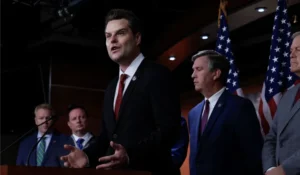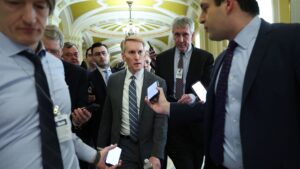South Carolina GOP Debate

For the past few months, the Republican candidates have been contending for the American vote, making passionate declarations, alluding to an all-consuming change if they are elected, and, in some cases, using the media to garner support. However, this past debate signifies the arrival of a new intensity in the competition. As primary voting draws closer, the amount of the American interest in the candidates is increasing, and, as a result, the candidates are becoming increasingly concerned with their popularity, or lack thereof.
These worries have led the candidates to become quite hostile regarding the issue of representation in the GOP debates. However, these concerns seem to have been in vain, as the Republican moderators seemingly went out of their way to give camera time to candidates such as Kasich, Christie, and Carson. In the beginning of the debate, things were looking up for these less popular candidates, being that every single one of them was questioned before the main act of the show, Donald Trump, was even addressed.
Unfortunately, their good fortune didn’t last. About half an hour into the debate, Trump was finally addressed about the harshness of his immigration policy, in which all Islamic immigrants would be turned away from the United States for the time being. At this point, he responded that his proposal was merely “realistic.” Although that question seemingly solicited a simply passionate answer, its true impact was the opening of a political Pandora’s box, which led to a twenty minute series of arguments between Trump and Cruz.
This exclusive exchange between Trump and Cruz addressed many issues of public interest rather than of political policies important to the position of presidency. A primary example was the confrontation over the legitimacy of Cruz’s status as a citizen. Trump claimed that, due to the fact that Cruz was born the son of an American citizen living in Canada, his right to run as president was questionable. When Cruz accused Trump of only bringing that matter up because his numbers were rising in the polls, Trump promptly agreed, conceding that it would be bad for the Republican Party if he won the candidacy and had a “question mark” over his head. The two candidates then proceeded to poke fun at each other, musing the possibility of granting one another the vice presidency when the time comes.
While this exchange, along with others, was no doubt amusing, for a section of the audience and no doubt the majority of the other Republican candidates, it was merely a distraction from the real issues at hand.
Cruz and Trump effectively captured the night’s key moments when they were talking about New York’s integrity, which Cruz accused of stemming from a “focus around money and the media.” Trump’s response was one of disgust and accusation, reminding the audience and Cruz of the strong virtues the citizens of New York showed in the face of the 9/11 crisis. It is important to note that his defense may have earned him the vote of New Yorkers when the time comes, many of whom already didn’t like Cruz due to his excessively conservative values.
In any other state, Trump would’ve been applauded wildly. However, his lack of praise, as well as the overwhelming support shown for Cruz through the debate, just serves as a testament to the stereotypical mind frame of conservative thought in South Carolina. The atmosphere definitely launched some candidates, such as Rubio and Cruz, into the spotlight in a positive light, while suffocating others, such as Kasich and Trump, with its accusatory glare. For example, Trump was booed multiple times when talking, something the popular candidate was not used to, but handled with humor and confidence. Additionally, at one point, Kasich was discouraged with the chant “we want Rand” (referring to candidate Rand Paul who had been excluded from the debate due to low poll numbers” when he began to speak. The moderator dismissed these chants with cool annoyance, but it didn’t erase the degrading effect it had to Kasich’s words.
As a whole, although the debate was meant to further debut candidates political opinions who hadn’t had much camera time in the past, the outcome was a series of arguments that had more of a personal than political nature. Unfortunately, despite the many opinions that were broadcasted, the distracting factors of the debate overshadowed the political necessity of the evening. It seems as though a dent had not been successfully made in the strong minded state of South Carolina, much less in the resolve of the average American viewer.








